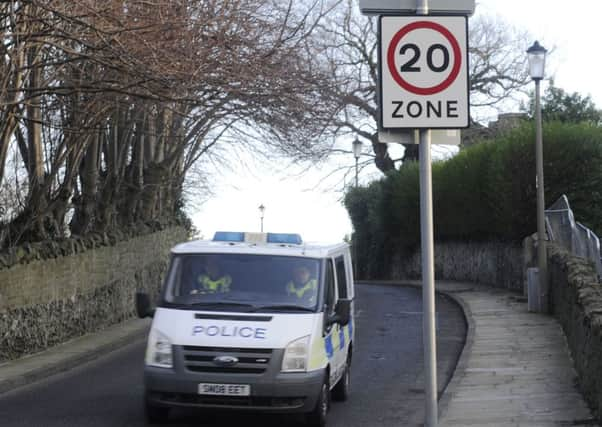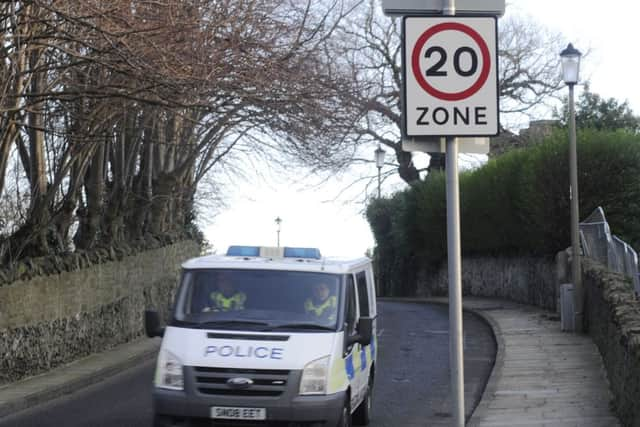20mph Edinburgh speed limit bill hits hits £2.2m


Around 80 per cent of city roads will be affected by the new limit under radical proposals given the go-ahead by councillors earlier this year.
Now detailed costs of signage, road markings, monitoring and awareness campaigns have been revealed for the first time, showing spending of £465,000 in the first year, split between the council and the Scottish Government.
Advertisement
Hide AdAdvertisement
Hide AdIn total, the council expects to put £1.14m into the project and hopes for £1.08m funding from the Government and transport charity Sustrans.


The phasing in of the 20mph restrictions will begin in February next year, but questions are growing over how the new network will be enforced.
Zones with the highest incidence of road collisions, pedestrian and cycling activity have been prioritised, transport leaders said. But with no mention of upgrades, enhancement or extension of Edinburgh’s fixed speed cameras – many of which are not approved to monitor for speeds of less than 30mph – it is unclear how comprehensive and routine enforcement of 20mph limits will be achieved.
Police have confirmed that they have a store of ten additional speed guns, reserved for community use, which are set to be deployed throughout the city.
Advertisement
Hide AdAdvertisement
Hide AdTheir enforcement role – financed under a £2.6m annual general policing payment from the city council – is expected to cover areas where there is a known accident risk or problems with speeding, as is the case under existing 30 and 40mph restrictions.
But the investment in the 20mph limits comes as the council seeks to reduce its annual grant to police amid a drive to slice £67m from the Capital’s budget by 2017-18.
More than 6000 residents have liked a “Say No to 20mph” page on Facebook and more than 2700 have signed a petition calling for the decision to be reversed.
Transport leader Lesley Hinds said: “This is us moving forward. There is a high percentage of people who support the 20mph network. I certainly believe that if you speak to people in residential areas, shopping areas, people want to bring the speed limit down, reduce accidents and create a nicer environment in Edinburgh.”
Advertisement
Hide AdAdvertisement
Hide AdNeil Greig, director of policy and research with the Institute of Advanced Motorists, said the 20mph plans were “a bit of a diversion” and called on Edinburgh to do more to improve the road system for all users.
He said: “The man in the street will think £2.2m on this is far too much, but in reality it’s not very much at all next to other campaigns.
“Over three years this will buy you some traffic signs and a bit of publicity when what we would like to see is a longer-term programme to change the streetscape of Edinburgh, to put in more facilities and separate drivers and cyclists as they do in Holland. Our worry has always been Edinburgh will spend what is a relatively small amount, put up a few signs and tick the ‘job done’ box when it’s really just job started.”
A Police Scotland spokeswoman said: “Police will respond to and deal with any reports of breaches to the speed limit, and enforcement will be in place around areas where there is a risk to the public, particularly around schools.”
The timetable
Advertisement
Hide AdAdvertisement
Hide AdONCE a speed limit order has been approved, the Capital’s 20mph network will be implemented in six phases, beginning in February next year.
The city centre and roads in the rural west will be the first to see new restrictions imposed, followed by districts in the north in June 2016.
South-central and east Edinburgh are next in line, with limits set to be implemented in October next year.
Areas in the north-west, west and south will be included in January, June and September 2017 respectively.
Advertisement
Hide AdAdvertisement
Hide AdTransport leaders said the phased roll-out would take place over 24 months, with each phase taking around 16 weeks to implement.
They said delivering the network in stages would allow them to introduce it as quickly as possible in areas with the highest levels of road accidents, pedestrian and cycling activity.
But they added that local consultation would continue to be carried out, which could result in boundaries changing in some phases.